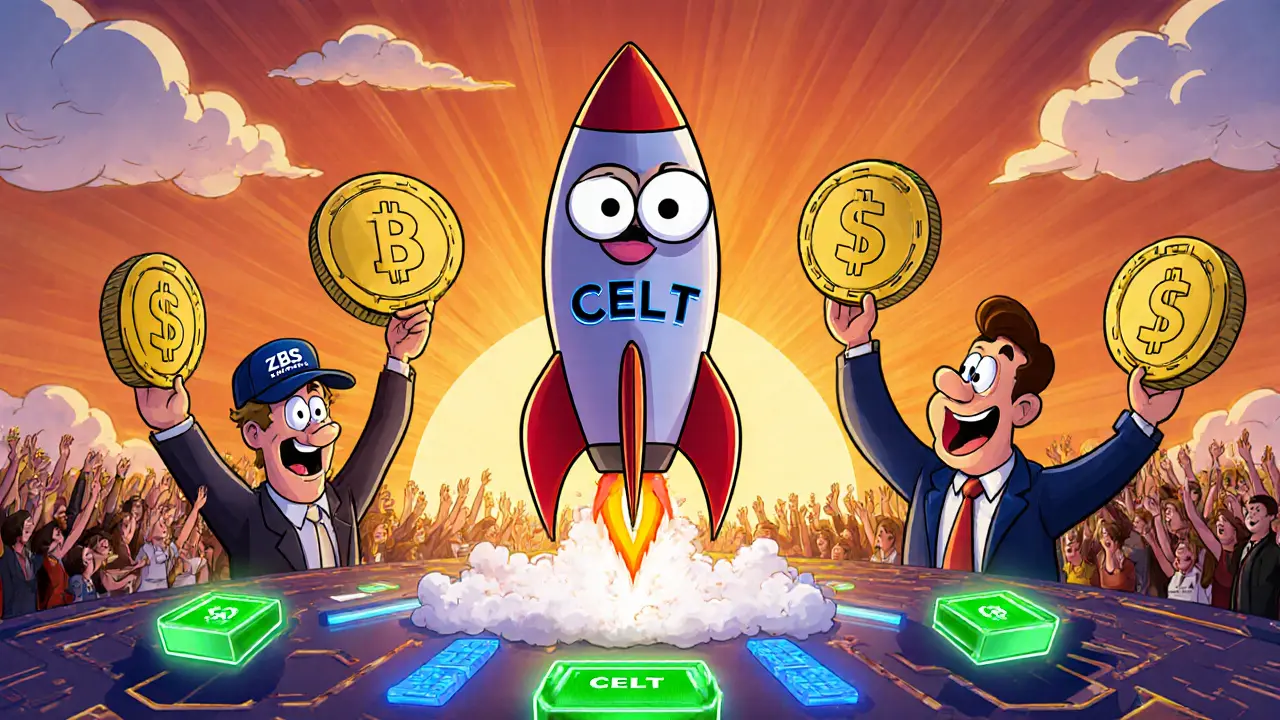CELT Token Distribution Calculator
Distribution Summary
Initial Unlock: 0 billion tokens
Monthly Tranche: 0 billion tokens/month
Total Released: 0 billion tokens
Remaining Locked: 0 billion tokens
Note: Based on the staged release model of Celestial (CELT). Initial 20% unlock followed by 10% monthly unlocks for 9 months.
Quick Takeaways
- Celestial (CELT) never ran a mass community airdrop; tokens were released to investors via a staged schedule.
- The project raised $1.49million across IDO, ICO and private sales, with a pre‑sale price of $0.002 per token.
- Current price sits around $0.00003674, a >98% drop from the pre‑sale level.
- CELT can be bought on Bitget using spot, swap or convert functions.
- For a true airdrop experience, look at the separate Celestia (TIA) ecosystem.
What is Celestial (CELT)?
When people talk about Celestial (CELT) is a blockchain‑based utility token launched after a Token Generation Event (TGE) on 30September2021. The token’s primary purpose is to power the Celestial ecosystem’s services, though public documentation on the exact use‑cases is sparse.
Token Generation Event & Total Supply
The TGE minted 4.92billion CELT tokens, with a hard cap set at 5billion. Because the launch timing was 02:05UTC+3, the blockchain recorded the exact block height for transparency. Out of the total supply, 700million (≈14.21%) were earmarked for private and pre‑sale investors.

Funding Rounds and Investor Allocation
Celestial ran three fundraising phases: an IDO, an ICO and a private‑sale round. The private round contributed $0.09million, while the pre‑sale alone pulled in $1.40million at $0.002 per CELT. In total, the project raised $1.49million.
The biggest backer was ZBS Capital, a Tier‑3 venture firm that provided strategic guidance and early liquidity.
Distribution Model vs Traditional Airdrop
Instead of sprinkling free tokens to a wide community, Celestial adopted a structured release schedule. The plan looked like this:
- First tranche: 20% of the allocated tokens unlocked immediately after launch.
- Subsequent tranches: 10% released each month for nine months.
This linear approach meant that the majority of tokens remained under investor control for a year, reducing immediate market pressure but also limiting community outreach.
Because there was no open‑ended airdrop, many users searching for a “Celestial airdrop” end up confused with the separate Celestia (TIA) program, which did conduct a large community airdrop.
Current Market Snapshot
As of October2025, CELT trades at roughly $0.00003674, giving the project a market cap of about $109K. That figure represents a >98% decline from the $0.002 pre‑sale price. The token’s all‑time high (ATH) provided a 72‑fold return for early buyers, but that peak has long since faded.
Circulating supply data is inconsistent: some explorers report 0CELT in circulation, while others show a modest figure reflecting the staged releases. This discrepancy hints at reporting lags or the possibility that many tokens are still locked in smart contracts.
How to Acquire CELT
For traders willing to take a risk, Bitget is the primary exchange listing CELT. The platform offers three convenient entry points:
- Bitget Convert: swap fiat or other crypto directly for CELT.
- Bitget Swap: perform peer‑to‑peer swaps without order‑book fees.
- Spot Trading: place limit or market orders on the CELT/USDT pair.
Additionally, Bitget provides margin, futures (USDT‑M and Coin‑M), and automated bot trading for those seeking higher leverage.

Celestial (CELT) vs Celestia (TIA) Airdrop - A Quick Comparison
| Aspect | Celestial (CELT) | Celestia (TIA) |
|---|---|---|
| Project Type | Utility token with investor‑focused distribution | Modular layer‑1 blockchain focused on data availability |
| Airdrop Presence | No mass community airdrop; staged investor releases | 60million TIA airdropped to ecosystem users and developers |
| Total Supply | 4.92billion (max5billion) | ≈10billion |
| Current Price (Oct2025) | $0.00003674 | ~$17.00 |
| Primary Exchange | Bitget | Multiple (Binance, KuCoin, etc.) |
While Celestial’s token economics have left little room for a traditional airdrop, Celestia’s community‑first approach generated buzz and attracted developers building on its network. Projects like AltLayer, Dymension and Manta Network are now promising secondary airdrops to TIA stakers, not CELT holders.
Risks & What to Watch
- Liquidity: CELT’s thin order books on Bitget can lead to slippage.
- Development Activity: Public roadmaps are scarce; no recent code commits have been verified on major platforms.
- Supply Dilution: The staged release schedule may still unleash large token batches, pressuring price.
- Regulatory Scrutiny: With a high concentration of tokens in early investors, any regulatory action could affect token availability.
Potential investors should treat CELT as a high‑risk speculative asset and only allocate capital they can afford to lose.
Future Airdrop Opportunities in the Celestia Ecosystem
If you’re chasing airdrops, shift your focus to the Celestia (TIA) network. Staking TIA on supported validators can qualify you for upcoming drops from projects like AltLayer, Dymension, and Manta Network. These programs are independent of Celestial (CELT) and operate under a different technical framework.
Frequently Asked Questions
Did Celestial (CELT) ever conduct a community airdrop?
No. Celestial’s token distribution was limited to private and pre‑sale investors, released via a structured monthly schedule rather than a free‑for‑all airdrop.
Where can I buy CELT tokens?
Bitget is the main exchange listing CELT. Use Bitget Convert, Swap, or the spot market to purchase the token.
How does the Celestial token release schedule work?
After the TGE, 20% of the allocated tokens unlocked immediately. The remaining 80% were released in ten‑percent monthly tranches over nine months.
Is Celestial (CELT) the same as Celestia (TIA)?
No. Celestial (CELT) is a separate utility token with its own blockchain project, while Celestia (TIA) is a modular layer‑1 network that performed a large community airdrop.
What are the main risks of holding CELT?
Key risks include low liquidity, limited development updates, potential token dilution from scheduled releases, and regulatory concerns due to concentrated early‑investor holdings.

It's not a coincidence that Celestial (CELT) emerged just as the crypto market was spiraling into a liquidity crisis, a timing so precise it suggests a coordinated effort by shadowy financiers to siphon off unsuspecting retail investors; the staged release model, with its 20% immediate unlock and subsequent 10% monthly tranches, reads like a textbook blueprint for market manipulation, allowing early insiders to dump large volumes before the broader community even gets a glimpse of the token; the fact that the project's current price is a minuscule fraction of its pre‑sale offering, coupled with the opaque reporting of circulating supply, raises red flags that the token's smart contracts might be deliberately obfuscated to conceal hidden reserves; consider the role of ZBS Capital, a Tier‑3 venture firm that allegedly provides strategic guidance yet remains largely invisible in public disclosures, a classic front for layered financial engineering; the $1.49 million raised appears modest, but when you factor in the potential undisclosed allocations held by early backers, the upside for them is astronomical compared to the $109 K market cap displayed today; the token's listing exclusively on Bitget, a platform with relatively low liquidity and high slippage, further compounds the risk of price manipulation, as thin order books are fertile ground for pump‑and‑dump schemes; the lack of a community airdrop, while marketed as a strategic choice, effectively shuts out grassroots participation, concentrating power in the hands of a few pre‑sale investors who can influence governance decisions unchallenged; every month, as a new tranche is released, there is a predictable spike in sell pressure, which smart traders can exploit, leaving ordinary holders to watch their already meager holdings erode; the continuous discrepancy between explorer data showing zero circulating supply and the contractual release schedule suggests either a technical glitch or a deliberate attempt to hide the true token flow, a tactic reminiscent of other notorious exit scams; the project's governance roadmap is scarce, with no recent code commits verified on major platforms, pointing to a stagnation that benefits those who already hold significant stakes; the regulatory environment is tightening, and projects with such concentrated early‑investor holdings are increasingly scrutinized, meaning any enforcement action could freeze large token portions, effectively wiping out the modest market cap; in sum, the entire structure of Celestial (CELT) seems engineered to enrich a select few at the expense of the broader crypto community, and investors should approach with extreme caution, recognizing the signs of a potential pump‑and‑dump orchestrated by insiders.
Indeed, the tokenomics appear convoluted, however, the staged release could provide a predictable liquidity curve, allowing traders to plan exits, and the low price may attract speculative interest, especially on Bitget.
Thanks for the breakdown! 😊 The comparison with Celestia (TIA) really helps to see why CELT didn’t do an airdrop. 👍
Yeah, the schedule is simple: 20% now, then 10% each month for nine months.
It keeps the price stable early on, but the thin market still makes trades pricey.
The philosophical angle here is interesting – projects often promise decentralization yet maintain heavy investor control.
When the majority of tokens stay locked, community governance is limited, raising questions about true decentralization.
Exactly! The liquidity is terrible, you’ll get slippage on every trade, and the token’s future is uncertain.
What a wild ride! The token started strong, then plummeted, but the story isn’t over yet.
There’s still a chance that new partnerships could revive interest, though the odds feel slim.
Meanwhile, the community can still rally around the data and push for more transparency.
Let’s keep an eye on Bitget’s volume spikes; they often hint at hidden buying pressure.
And remember, even a tiny upside can be rewarding for those who bought at the rock‑bottom price.
Honestly, I think most people miss the point – the token was never meant to be a giveaway, it was a fundraising tool, so stop hunting for a mythical airdrop.
yo the token looks low but idk if its worth the risk lol
It’s absolutely unacceptable that a project with such a massive token supply can hide its circulating numbers; investors deserve full transparency, not vague statements about “reporting lags.”
Upon meticulous examination of the aforementioned token distribution schema, one discerns a conspicuous absence of verifiable audit trails, thereby engendering a milieu wherein speculative participants are inevitably predisposed to fiduciary jeopardy; the paucity of disclosed developmental milestones further compounds the opacity, rendering any prospective valuation exercises tantamount to conjectural extrapolation rather than empirical assessment; consequently, prudent market actors ought to circumscribe exposure to such instruments until demonstrable progress materializes.
Look, the math checks out: 20% now, 10% each month. If you’re not comfortable with the thin order books on Bitget, just stay out – no need to buy into a token that’s essentially a cash‑cow for early investors.
Indeed, the data is clear: the token’s price has collapsed, but that also means there’s room for a modest rebound if the community decides to rally around the project’s core utilities.
True, but we also need to consider the broader market sentiment; a lot of people just moved on.
Oh sure, because a 98% drop totally makes it a goldmine – sarcasm fully intended.
i think it's still worth a look, maybe some new dev updates will give it a push. just keep small caps in mind.
For anyone considering CELT, remember to allocate only what you can afford to lose and diversify across multiple assets to mitigate risk.
While the inherent risks are undeniable, there is a philosophical merit in supporting nascent blockchain projects that aim to provide utility beyond mere speculation; by diversifying your portfolio with a modest position in CELT, you contribute to the ecosystem’s potential growth, and should the team deliver on its roadmap, even a slight uptick could offset the broader market downturn; however, maintain a disciplined stop‑loss strategy to protect against the token’s notorious volatility, and continuously monitor Bitget’s order book depth for signs of emerging liquidity; in essence, treat the investment as a learning experience rather than a guaranteed profit vehicle.
Okay, but honestly the drama around this token is just exhausting.
From a technical standpoint, the contract’s tokenomics are transparent, but the market dynamics on Bitget suggest limited depth, indicating that any sizable order could cause significant price impact; investors should therefore employ limit orders and consider incremental purchases to avoid adverse slippage.